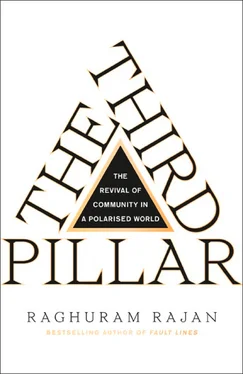The more unemployed workers there were – the so-called reserve army, set adrift as enclosures rendered agricultural labour redundant and better machines rendered industrial workers redundant – the lower would be the employed worker’s alternative options, her bargaining power, and hence her wage. The industrialist’s profits would rise. By emphasising labour as the only source of value, Marx was wrong, but not out of line with economic thinkers of his time. This theorising also meant that all profits ought morally to belong to labour, and the profits accruing to the industrialist were mere exploitation, made possible by his property rights over capital.
But Marx went further to say that the capitalist structure of ownership was economically unsound, and the world should change for this reason only, even if it was not convinced by the moral argument. Essentially, competition would force the profit accumulated by the industrialist to be reinvested in yet more productive machines, forcing more workers out of the labour force, pushing wages further down. Crises, where product prices collapsed and industrial losses exploded, could arise for a variety of reasons. Along the lines of Rockefeller’s thinking, it could stem from the myopic greed or irrational exuberance of industrialists, pushing to get a greater share of the market, and ending up overinvesting and overproducing. It could arise when overindebted industrialists, pressed by bankers to repay, dumped their excess inventory and machines on the market. Most important, it could arise because the true source of industrial profits was appropriating the surplus value of labour. As the quantity of labour fell relative to accumulated capital machinery, Marx believed it was inevitable that the rate of profit would also fall, and hence the susceptibility of the system to accidents and crises would rise. A more modern version would be that as labour’s wages were squeezed, the ability of workers as consumers to buy what was produced would fall, leading to overproduction and crises. 18
When crisis hit, the Rockefellers of the industrial world would buy up failing competitors, close them down and fire their workers, and eventually restore equilibrium between supply and demand, but with much distress for all. The collapse of capitalism was not inevitable – it might be stuck in perpetual torment. As the Russian revolutionary Leon Trotsky wrote, ‘capitalism does live by crises and booms, just as a human being lives by inhaling and exhaling. First there is a boom in industry, then a stoppage, next a crisis, followed by a stoppage in the crisis, then an improvement, another boom, another stoppage, and so on…. The fact that capitalism continues to oscillate cyclically … merely signifies that capitalism is not yet dead, that we are not dealing with a corpse. So long as capitalism is not overthrown by proletarian revolution, it will continue to live in cycles, swinging up and down. Crises and booms were inherent in capitalism at its very birth; they will accompany it to its grave.’ 19
The Marxist solution to the problem – ending competition – resembled Rockefeller’s, except Marxists wanted to replace the monopolist capitalist with the dictatorship of the proletariat. Since they argued capital was essentially accumulated profit extracted by squeezing labour (or amassed from other dishonorable activities buried in a typical family enterprise’s past like smuggling, bootlegging, usury, war profiteering and outright theft), the capitalist should be expropriated. All property would be held by the state in the name of the working proletariat, and a centralised bureaucracy would make production decisions. As Frederick Engels wrote, ‘If the producers as such knew how much the consumers required, if they were to organise production, if they were to share it out amongst themselves, then the fluctuations of competition and its tendency to crisis would be impossible.’ 20
Therefore, instead of the benevolent Rockefeller directing production and prices, it would be the benevolent revolutionary turned bureaucrat. Once again, what would prevent the benevolent from becoming self-interested? No amount of idealistic Marxist literature prevented the chosen elite, the nomenklatura, a superclass that had access to the best shops and the choicest luxuries, from emerging in every Marxist country, even as the fundamental inefficiencies of centralised monopolistic production slowed growth. Without competition to show up inefficiencies and penalize the merely greedy, and without the decentralized decision making that Adam Smith and later Friedrich Hayek thought was essential to make best use of local information, centralised monopolies eventually ended up as a sclerotic mess, as exemplified by the former Soviet Union.
In a sense, though, revolutionary Marxism had the potential to be much worse than monopoly capitalism, for it eliminated political competition explicitly, concentrating political power and economic decision making in the same hands. Anarchists like Mikhail Bakunin fought against the centralized state implied by Marxism, and argued for decentralised self-governing structures, only to see their influence in radical Left circles diminish. The communists, like Rockefeller, wanted to retain all the power to decide for themselves.
Fortunately, neither Rockefeller’s nor Marx’s vision was realised in the industrialising West. Democracy preserved market competition, and market competition preserved democracy. That is what we will examine in the remainder of this chapter, and in the next one, focusing on the special role played by the community.
EXTENDING THE FRANCHISE
Early in their industrialisation, most market economies concentrated economic and political power in the same hands – even in the middle of the nineteenth century, British cabinets were dominated by the landed peerage. However, as the dissatisfaction of the working classes mounted, the elite recognised that while their explicit responsibility for the rest had evaporated with the end of feudalism, some accountability had to be restored for the nation as a whole to function with more cohesion. The centralised government of the nation-state had stripped the community of some of the powers to determine local policies, even while the Industrial Revolution and the changing market brought many new pressures that the community needed addressing. Those lower down on the economic pyramid demanded a political say – else their plight would simply be dismissed, as it always has been, as the unpleasant but unavoidable consequences of progress. Undoubtedly, if the state was weak and ineffective, a coup or revolution from below was always a possibility. If it was stronger, though, the underprivileged had to stay broadly within the system to change it. In nascent democracies, this meant pushing for broader enfranchisement.
In feudal England, the right to vote was reserved for male ‘freeholders’, that is, those who had independent ownership of land. 21Ostensibly, these would have a long-term interest in the well-being of the community. 22More plausibly, property holders believed that by keeping the vote restricted to people like themselves, they would protect their property from the poor. They would also prevent the state from expropriating their wealth to finance imprudent spending. Indeed, despite a war of independence against the British in which Americans from all economic strata participated, the newly independent colonies of the United States typically restricted the right to vote to those men with property, with only Pennsylvania and South Carolina going further to allow all men who paid taxes to vote. In all these would-be states, women and slaves were excluded.
Over time, the vote was extended. None of the states that joined the Union after the original thirteen had property requirements restricting voting eligibility. Even the majority of the original thirteen colonies that entered the Union eliminated the property requirement by the middle of the nineteenth century, with the battle over economic-based restrictions on franchise waged seriously only in the older states like Massachusetts, New York, and Virginia, where land or wealth inequality was more pronounced, and populations more diverse. 23Even in venerable old England, suffrage steadily expanded during the nineteenth century as property requirements for eligibility were whittled down, in 1832 to include the middle class, in 1867 the urban worker, and in 1884 rural workers. 24
Читать дальше












